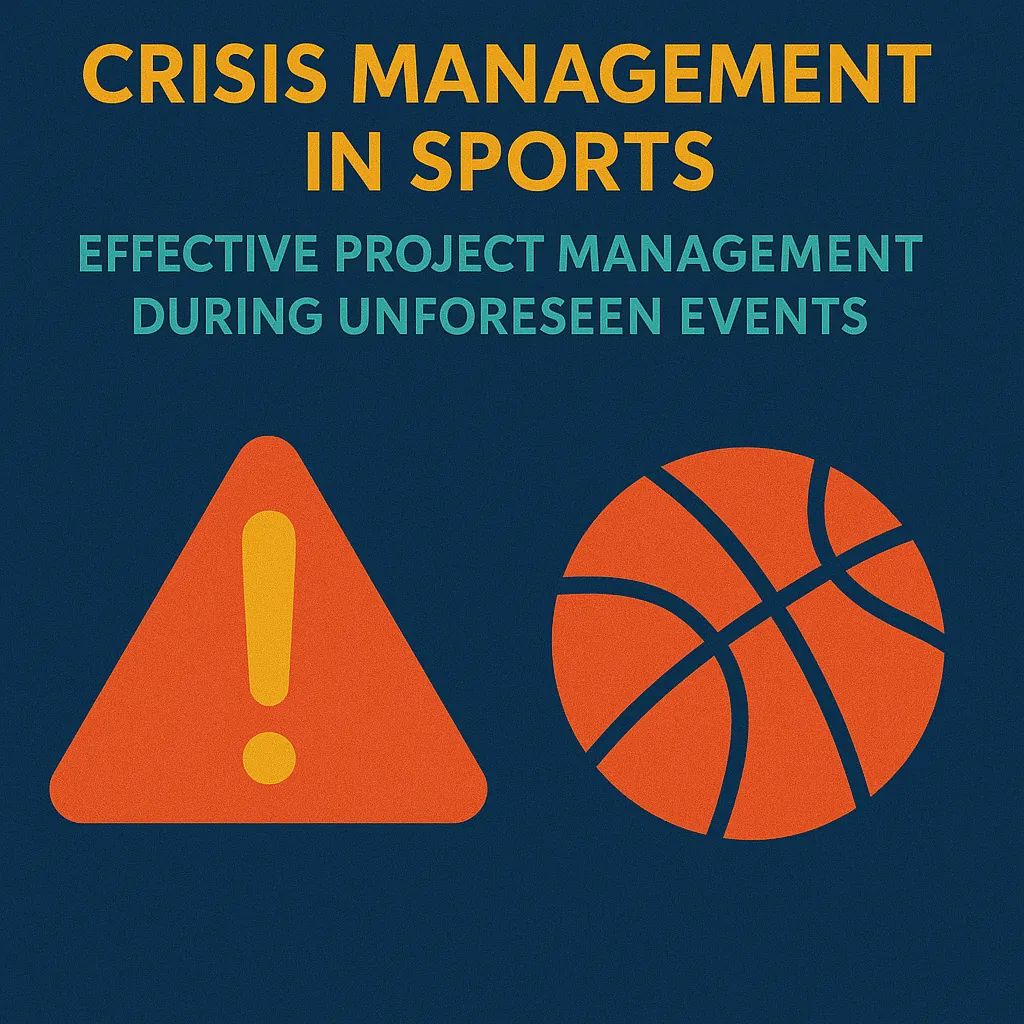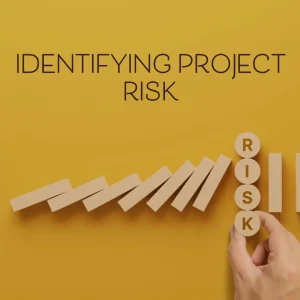Introduction
The sports industry is a dynamic and multifaceted sector that encompasses a wide range of activities, from professional leagues and events to grassroots initiatives. This industry faces unique challenges, including fluctuating public interest, financial pressures, and the unpredictability of events such as injuries, scandals, or even global crises like the COVID-19 pandemic. These factors necessitate a robust approach to project management, particularly in times of crisis.
Crisis management in the context of sports refers to the processes and strategies employed to identify, respond to, and mitigate the impact of critical events that could harm an organization or its stakeholders. This includes not only the immediate response to a crisis but also the planning and preparation that precedes it. Effective crisis management is essential for maintaining the integrity of sports organizations and ensuring the safety and satisfaction of fans, athletes, and sponsors alike.
Strategic project management becomes particularly crucial during unforeseen events. It involves careful planning, prioritization of goals, and the ability to adapt quickly to changing circumstances. By employing effective project management strategies, sports organizations can navigate crises more efficiently, minimizing potential damage and ensuring a swift recovery. This proactive approach not only helps in managing the immediate fallout but also positions organizations to emerge stronger and more resilient in the long run.
Understanding Crises in Sports
In the dynamic world of sports, crises can arise unexpectedly, necessitating effective project management strategies to navigate through these challenges. Understanding the various types of crises that can occur in the sports industry is crucial for crisis managers and event planners. Here are some key categories of crises that sports organizations may face:
- Natural Disasters: Events such as floods, hurricanes, and earthquakes can severely disrupt sporting events and operations. These disasters can lead to venue closures, safety concerns for players and fans, and significant financial losses. Effective project management during such crises involves developing contingency plans, ensuring safety protocols, and communicating with stakeholders to mitigate the impact of these events [1].
- Health Crises: The COVID-19 pandemic highlighted the vulnerability of the sports industry to health-related crises. Such situations can include widespread illnesses, player injuries, or outbreaks that affect teams and events. Project managers must be prepared to implement health and safety measures, adjust schedules, and communicate changes to fans and participants to maintain trust and safety [2].
- Public Relations Crises: Scandals involving players, coaches, or organizations can lead to significant public backlash and damage to reputations. Incidents involving fan behavior or controversies can also escalate into crises. Effective crisis management in these scenarios requires swift communication strategies, transparency, and a plan to restore public confidence [3].
- Operational Crises: Issues related to venue management, technology failures, or logistical challenges can disrupt events. For instance, problems with ticketing systems, sound equipment, or even transportation can lead to chaos during an event. Project managers need to have robust operational plans in place, including backup systems and clear communication channels to address these issues promptly [4].
By understanding these types of crises, crisis managers and event planners in the sports industry can develop comprehensive strategies to effectively manage projects during unforeseen events, ensuring the safety and satisfaction of all stakeholders involved.
The Role of Project Management in Crisis Situations
Crises can arise unexpectedly, necessitating a robust project management approach to navigate these challenges effectively. The application of project management principles during such unforeseen events is crucial for ensuring that operations continue smoothly and that stakeholders are kept informed and engaged. Here are some key points on how project management methodologies and processes can be adapted for crisis response in sports.
Project Management Methodologies Adapted for Crisis Response
- Agile Methodology: Agile project management emphasizes flexibility and rapid response to change, making it particularly suitable for crisis situations. In the context of sports, this approach allows teams to quickly adapt their strategies based on real-time information and evolving circumstances. Agile practices, such as iterative planning and regular feedback loops, enable crisis managers to pivot effectively as new challenges emerge [6].
- Waterfall Methodology: While Agile is beneficial for its adaptability, the Waterfall methodology can also play a role in crisis management by providing a structured approach to project phases. This method is useful when the crisis requires a clear sequence of actions, such as in the case of a major event cancellation or rescheduling. By following a linear process, teams can ensure that all necessary steps are taken in a timely manner [6].
Key Project Management Processes
- Initiation: The first step in crisis management involves identifying the crisis and assessing its potential impact on operations. This phase is critical for establishing a clear understanding of the situation and determining the necessary resources and stakeholders involved [2].
- Planning: Effective planning is essential for outlining the response strategy. This includes developing contingency plans, allocating resources, and defining roles and responsibilities among team members. A well-structured plan helps to minimize confusion and ensures that everyone is aligned on the objectives during the crisis [1][8].
- Executing: During the execution phase, the crisis management plan is put into action. This requires coordination among various teams and stakeholders to implement the strategies developed during the planning phase. Quick decision-making and adaptability are key during this stage to address any unforeseen developments [9].
- Monitoring: Continuous monitoring of the situation is vital to assess the effectiveness of the response. This involves tracking progress against the plan, gathering feedback, and making necessary adjustments. Regular updates help to keep all stakeholders informed and engaged, which is crucial for maintaining trust and transparency [7].
- Closing: Once the crisis has been managed, the closing phase involves evaluating the response and documenting lessons learned. This reflection is important for improving future crisis management strategies and ensuring that the organization is better prepared for similar situations in the future [5].
Importance of Communication and Stakeholder Management
Effective communication is a cornerstone of successful crisis management in sports. During a crisis, stakeholders—including athletes, sponsors, fans, and media—must be kept informed about developments and decisions. Clear and timely communication helps to mitigate misinformation and maintain stakeholder confidence [3][4].
- Stakeholder Engagement: Engaging stakeholders throughout the crisis response process is essential. This includes understanding their concerns, providing regular updates, and involving them in decision-making where appropriate. Strong stakeholder management fosters collaboration and can lead to more effective solutions during challenging times [8].
Strategies for Effective Crisis Management in Sports Projects
In the dynamic world of sports, unforeseen events can disrupt even the most meticulously planned projects. Effective crisis management is essential for crisis managers and event planners to navigate these challenges successfully. Here are actionable strategies to implement during crises in the sports industry:
- Risk Assessment and Contingency Planning: Conducting a thorough risk assessment is the first step in crisis management. Identify potential risks that could impact the project, such as natural disasters, health emergencies, or security threats. Develop contingency plans that outline specific actions to take in response to these risks. This proactive approach ensures that the team is prepared to act swiftly and effectively when a crisis arises.
- Establishing a Crisis Management Team and Defining Roles: Form a dedicated crisis management team that includes key stakeholders from various departments, such as operations, communications, and security. Clearly define roles and responsibilities within the team to ensure a coordinated response. This structure allows for efficient decision-making and resource allocation during a crisis, minimizing confusion and delays.
- Developing a Communication Plan for Stakeholders and Media: A well-crafted communication plan is vital for managing information flow during a crisis. Establish protocols for communicating with stakeholders, including athletes, sponsors, and fans, as well as the media. Ensure that the messaging is clear, consistent, and timely to maintain trust and transparency. This plan should also include designated spokespersons to handle media inquiries and provide updates.
- Utilizing Technology for Real-Time Project Tracking and Updates: Leverage technology to enhance crisis management efforts. Utilize project management software and communication tools that allow for real-time tracking of project status and updates. This technology can facilitate collaboration among team members, enabling them to respond quickly to changing circumstances and share critical information efficiently.
- Post-Crisis Evaluation and Lessons Learned to Improve Future Responses: After a crisis has been managed, conduct a thorough evaluation to assess the effectiveness of the response. Gather feedback from team members and stakeholders to identify what worked well and what could be improved. Document these lessons learned to refine crisis management strategies for future projects. This continuous improvement process is essential for enhancing resilience and preparedness in the face of future crises.
By implementing these strategies, crisis managers and event planners in the sports industry can effectively navigate unforeseen events, ensuring that projects remain on track and stakeholders are kept informed and engaged.
Case Studies: Successful Crisis Management in Sports
Crises can arise unexpectedly, necessitating effective project management strategies to navigate through challenges. This section highlights notable crises in the sports industry, analyzes how specific organizations managed these situations, and draws lessons that are relevant to project management.
Notable Crises in Sports
- COVID-19 Pandemic: The global pandemic had a profound impact on sports events worldwide, leading to cancellations, postponements, and the need for new health protocols. Major leagues, including the NBA and NFL, faced unprecedented challenges in maintaining their seasons while ensuring the safety of players, staff, and fans.
- 2015 FIFA Corruption Scandal: This scandal rocked the world of soccer, leading to multiple arrests and a significant loss of trust in the organization. The fallout required FIFA to implement extensive reforms and crisis communication strategies to restore its image.
- 2017 Manchester Arena Bombing: Following the tragic bombing at an Ariana Grande concert, the response from local sports teams and organizations was crucial in providing support and ensuring safety at future events. This incident highlighted the importance of crisis preparedness in event management.
Analysis of Crisis Management Strategies
- Proactive Planning: Organizations that had crisis management plans in place were better equipped to handle the disruptions caused by COVID-19. For instance, the NBA quickly developed a “bubble” environment to safely resume its season, demonstrating the effectiveness of pre-established protocols and adaptability in project management [4].
- Transparent Communication: During the FIFA scandal, FIFA’s leadership faced criticism for a lack of transparency. However, subsequent efforts to communicate openly about reforms and changes helped to rebuild trust with stakeholders. This underscores the importance of clear communication in managing crises effectively [5].
- Collaboration and Support: In the aftermath of the Manchester Arena bombing, local sports teams collaborated with law enforcement and community organizations to enhance security measures and provide support to victims. This collaborative approach is essential in crisis management, as it fosters solidarity and shared responsibility among stakeholders [6].
Lessons Learned and Relevance to Project Management
- Flexibility and Adaptability: The ability to pivot quickly in response to changing circumstances is crucial in project management. The NBA’s successful implementation of a bubble environment serves as a prime example of how flexibility can lead to successful outcomes during crises [4].
- Importance of Stakeholder Engagement: Engaging with stakeholders, including fans, sponsors, and community members, is vital during a crisis. Organizations that prioritize stakeholder communication and involvement can mitigate negative impacts and foster loyalty [2].
- Continuous Improvement: Each crisis presents an opportunity for organizations to learn and improve their crisis management strategies. By analyzing past crises, sports organizations can refine their approaches and enhance their preparedness for future challenges [3].
Challenges in Crisis Management for Sports Projects
Crisis management in the sports industry presents unique challenges that require effective project management strategies. Understanding these challenges is crucial for crisis managers and event planners to navigate unforeseen events successfully. Here are some of the key challenges faced in this domain:
- Limited Time and Resources: Crises often arise unexpectedly, leaving little time for preparation and response. This urgency can strain available resources, making it difficult for teams to implement effective solutions. The pressure to act quickly can lead to hasty decisions that may not be in the best interest of the organization or its stakeholders [5].
- Managing Diverse Stakeholder Interests: The sports industry involves a wide range of stakeholders, including athletes, sponsors, fans, and regulatory bodies. Each group has its own interests and expectations, which can complicate decision-making during a crisis. Balancing these diverse interests while ensuring effective communication and collaboration is a significant challenge for crisis managers [6].
- The Unpredictability of Crises and Their Impacts: Crises can vary greatly in nature and severity, making it difficult to predict their impacts on projects. Whether it’s a public safety issue, financial loss, or reputational damage, the unpredictable nature of crises requires managers to be adaptable and prepared for various scenarios. This unpredictability can hinder long-term planning and resource allocation [9].
- Maintaining Team Morale and Public Trust During Crises: Crises can take a toll on team morale, especially when uncertainty looms. It is essential for crisis managers to foster a supportive environment that encourages open communication and collaboration among team members. Additionally, maintaining public trust is critical; effective communication strategies must be employed to keep stakeholders informed and engaged, thereby mitigating potential backlash and preserving the organization’s reputation [5][6].
Conclusion
Effective project management during crises is not just beneficial; it is essential for safeguarding the integrity and reputation of organizations. As we have explored, several strategies can be employed to navigate unforeseen events successfully:
- Structured Frameworks: Implementing a structured crisis management framework allows teams to respond swiftly and effectively to unexpected challenges. This framework should include clear roles and responsibilities, ensuring that all team members know their tasks during a crisis [2][4].
- Crisis Communication Plans: Developing robust internal and external communication strategies is crucial. These plans should outline how information will be disseminated to stakeholders, media, and the public, minimizing misinformation and protecting the brand’s image [1][8].
- Training and Simulations: Regular training sessions and crisis simulations prepare teams for real-life scenarios. This proactive approach not only enhances team readiness but also builds confidence in handling crises [5][7].
- Learning from Past Events: Analyzing previous crises in the sports industry provides valuable lessons. By understanding what worked and what didn’t, organizations can refine their strategies and improve their response mechanisms for future incidents [3][6].
As we conclude, it is imperative to emphasize the importance of ongoing training and preparedness. Crisis management is not a one-time effort but a continuous process that requires regular updates and practice. Organizations should foster a culture of resilience, where team members are encouraged to engage in continuous improvement and learning. This commitment to preparedness will not only enhance project management capabilities but also ensure that sports organizations can effectively navigate any crisis that may arise in the future. By prioritizing these strategies, crisis managers and event planners can significantly mitigate risks and uphold the reputation of their organizations in the face of adversity.
Find out more about Shaun Stoltz https://www.shaunstoltz.com/about/.
This post was written by an AI and reviewed/edited by a human.



